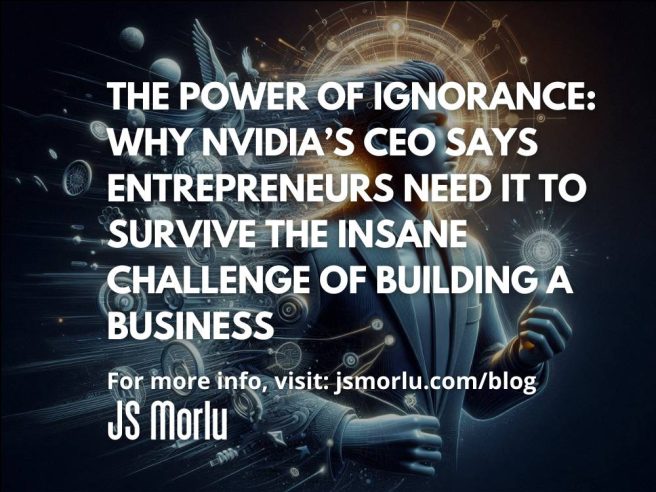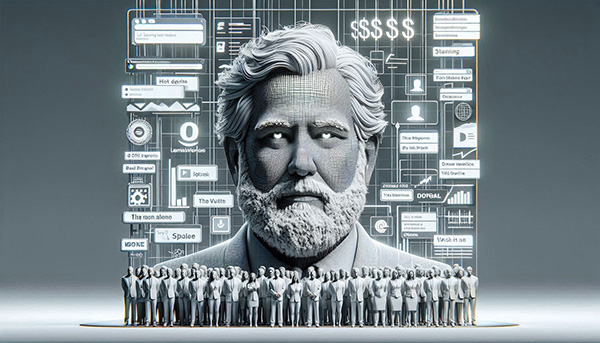By: John S. Morlu II, CPA
Building a company is not for the faint of heart. While the notion that entrepreneurship is challenging is common knowledge, many ambitious founders still plunge into the world of startups with all the enthusiasm of a knight charging into battle, blissfully unaware of the dragons that await them. But what if this blissful ignorance isn’t a disadvantage, but a hidden superpower? Jensen Huang, the visionary co-founder and CEO of Nvidia, certainly seems to think so. According to Huang, it was this very ignorance that shielded him from the daunting realities of building Nvidia—a company that, after three decades of relentless effort, has become a $3 trillion giant in the realm of AI and chips.
Reflecting on his 32-year journey, Huang openly admits that if he had truly understood the monumental challenges ahead, he probably wouldn’t have even started. And here’s the kicker—this sentiment resonates with many of the world’s most successful founders. The unvarnished truth? Entrepreneurship is often far more grueling than anyone expects, and maybe that’s exactly why some succeed. Without the fear of failure looming large from the start, founders are free to chase their visions with reckless abandon, solving problems as they come.
In this article, we’ll explore why entrepreneurial ignorance might just be the greatest asset for those looking to build something extraordinary. We’ll delve into the paradox of not needing to know everything (and why it’s sometimes better that way), and how embracing the unknown can propel entrepreneurs to unprecedented success. Along the way, we’ll add a dash of humor, some fun facts, and good old common sense, making this exploration of the entrepreneurial mindset as engaging as it is enlightening. Buckle up—it’s going to be a fun ride!
Chapter 1: Ignorance Is Bliss—But Also a Superpower
What did Jensen Huang mean when he said ignorance is a superpower for founders? He wasn’t advocating for a lack of knowledge or a carefree attitude. Rather, the idea is that being blissfully unaware of the obstacles in your path can propel you forward with an enthusiasm that might otherwise be crushed by reality. Picture this: if someone handed you a manual that said, “Starting a business involves endless paperwork, sleepless nights, and wondering if your last client is going to pay you before you can afford to buy groceries,” would you still dive in headfirst? You might think twice unless you have a penchant for thrill-seeking!
Statistically, 90% of startups fail. Ouch! But here’s the kicker: entrepreneurs are starting over 305 million new businesses each year worldwide. It’s like watching people line up for a bungee jump without knowing the statistics on how many people are actually afraid of heights. The bold ones—armed with nothing but a rope and a dream—will jump, scream, and, hopefully, float back down to earth with a million-dollar idea.
Huang’s perspective can be likened to a toddler riding a tricycle—oblivious to the concept of gravity and impending doom. They zoom around, giggling, while you panic in the background, envisioning scraped knees and tears. The joy of the ride is what keeps the little ones moving, just as the excitement of entrepreneurship propels founders into the unknown.
Fun Fact: The Lemonade Stand Complex
Every entrepreneurial journey begins with a simple idea—like the classic lemonade stand. Remember those days? You’d set up a table, whip up a batch of that tart goodness, and hope people would actually stop. But let’s be real, how many of us thought beyond that? The moment you start scaling that idea into a multi-billion-dollar empire, you’re no longer just squeezing lemons and tossing ice into cups. Suddenly, you’re negotiating prices with lemon suppliers in sunny California, managing a fleet of delivery trucks, and dodging that rival who decided to sell organic lemonade at half your price! It’s a sticky situation!
What’s so magical about ignorance in this context is that when you start, your focus is laser-sharp—just making the lemonade. If you knew about the army of hurdles ahead, you might hesitate before setting up shop. In business, it’s often better to be that naïve child selling lemonade without a care in the world. And here’s a pro tip: if anyone asks if your lemonade is organic, just nod and smile—it’s all about the branding!
Chapter 2: Huang’s Nvidia Journey: An Entrepreneurial Marathon
When Jensen Huang founded Nvidia in 1993, he didn’t exactly walk into a plush office filled with engineers and a clear roadmap to success. No, he was just a guy in his early 30s with a couple of co-founders and dreams bigger than their budget. Picture Huang in his cluttered office, surrounded by takeout containers, frantically trying to figure out how to make graphics cards. It’s the start of a classic underdog story—if only Hollywood knew how to write business scripts!
Huang famously remarked, “Building Nvidia turned out to have been a million times harder than I expected.” And let’s face it: if you believed starting a company was as easy as ordering a pizza, you might be in for a surprise. Building a company involves assembling a team of brilliant minds, navigating fierce competition, and constantly evolving. It’s not just a marathon; it’s like an obstacle course where someone keeps adding more hurdles mid-race!
It took decades for Nvidia to rise from the depths of obscurity to the pinnacle of the tech world. During those years, Huang likely consumed enough coffee to fuel a small nation. You know that phase in life when you think you’re invincible? Huang embraced it fully—throwing caution to the wind and diving headfirst into every challenge. Remember that time you decided to leap before looking, and ended up in the neighbor’s flower bed? Yeah, it’s kind of like that!
Fun Fact: The GeForce Gamble
One of Nvidia’s biggest breakthroughs came when they decided to create the modern GPU, starting with the GeForce 256 in 1999. At that time, Huang and his team weren’t sure if the market would embrace such technology. It was a gamble, a roll of the dice, akin to betting your last $20 on a horse named “Lucky Strikes” at a not-so-lucky racetrack. Spoiler alert: it paid off!
Fast forward to today, and GPUs are everywhere—powering everything from video games to AI research. Huang didn’t know the GeForce line would define Nvidia; he was just trying to keep the lights on and make some noise in the tech world. It’s like being at a party where you accidentally trip and knock over the punch bowl—but instead of embarrassment, you find out it’s a giant piñata filled with success!
Chapter 3: The Hidden Benefits of Not Knowing
Ignorance can fuel progress, but what are the hidden benefits of this mindset? Let’s dig deeper:
1. Less Fear, More Action: When you don’t fully grasp the mountain of challenges ahead, fear tends to take a backseat. You’re like that fearless kid climbing a tree, blissfully unaware that gravity is waiting to play tricks. Ignorant founders are more likely to push boundaries, while those well-versed in the harsh realities of business might hesitate. It’s like watching someone eat a really spicy chili pepper; the unprepared go all-in, while the seasoned veterans are reaching for milk!
2. Focus on the Now: The beauty of ignorance is that it allows you to concentrate on immediate tasks rather than worrying about what tomorrow holds. You solve today’s problems instead of being paralyzed by a lengthy to-do list that would make even the most organized person weep. Imagine cooking a gourmet meal without a recipe—you throw things into a pot and pray it doesn’t explode. Sometimes, that approach can yield surprisingly delicious results!
3. Learning on the Job: Huang’s journey at Nvidia exemplifies constant learning. Founders who start with limited knowledge develop the ability to adapt quickly. As businesses grow, the skills required change, and the best learning often happens through trial and error. Remember that time you tried to fix your computer and ended up resetting it to factory settings? Yeah, sometimes you learn the hard way, and that’s okay!
4. Creativity Thrives in Constraints: Being in the dark forces you to get creative. Without a complete understanding of the rules, you can think outside the box—or rather, outside the entire room!
Fun Fact: Dyson, the vacuum cleaner innovator, didn’t set out to build bladeless fans or hair dryers. Those ideas sprouted from their vacuum technology. Sometimes, when life hands you lemons, you accidentally create a lemon-scented vacuum cleaner! You may not have known where you were headed, but those detours can lead to incredible innovations.
Chapter 4: Data: How Ignorance Fuels Startups
Huang’s perspective isn’t unique. Research on entrepreneurship shows that most founders are blissfully unaware of the hurdles ahead. According to a study by the Global Entrepreneurship Monitor, 39% of early-stage entrepreneurs didn’t know much about their industry when they dove in. It’s like jumping into a pool without checking the water temperature—sure, it might be cold, but at least you’re already in the game!
And yet, many of these entrepreneurs succeed. Why? Because new entrepreneurs aren’t shackled by preconceived notions. They’re unencumbered by the “rules” of the industry, which often makes them less predictable. It’s like when a kid on the playground decides to reinvent tag by adding a trampoline—unexpected, chaotic, and hilarious!
Many successful entrepreneurs had little to no background in their respective industries. Howard Schultz, the man behind Starbucks, didn’t start as a coffee expert. He began as a salesman. His ignorance allowed him to see the coffee industry through a fresh lens—and that’s what made Starbucks the caffeinated empire it is today. Imagine if he had known that baristas would be spending more time perfecting foam art than brewing coffee!
Chapter 5: Humor in the Hardship
Let’s not sugarcoat it—building a business is tough, often ridiculously so. But here’s the silver lining: if you can laugh at the chaos, it becomes easier to navigate. That’s one of the side benefits of being blissfully ignorant; you embrace the absurdity of entrepreneurship like a contestant on a reality show trying to survive in a jungle.
Picture yourself pitching to investors, sweating bullets while your product prototype is mysteriously “lost” in transit. Or how about that moment when you realize you’ve ordered 1,000 branded coffee mugs but forgot to design a logo? If you were fully aware of these potential mishaps from day one, you might have turned back at the door!
Fun Fact: When Richard Branson founded Virgin Atlantic, his first airline venture, he had no background in aviation. On the inaugural flight, they faced mechanical issues, and Branson had to charm the passengers into not demanding refunds. That’s a tough sell—convincing people to stay calm when the plane is doing its best impression of a wobbly rollercoaster!
Chapter 6: The Takeaway: Embrace the Unknown
In the end, ignorance isn’t about being foolish; it’s about stepping into the unknown with confidence. Jensen Huang is living proof that you don’t need to have it all figured out to build a $3 trillion company. You just need the resilience to learn, the creativity to adapt, and the tenacity to push through.
So, when life hands you those sour lemons, remember that each squeeze is an opportunity to make something great—be it lemonade or the next big tech innovation. Embrace the uncertainty, the challenges, and even the ignorance. After all, some of the best ideas have emerged from the messy, chaotic, and unpredictable world of entrepreneurship!
Author: John S. Morlu II, CPA is the CEO and Chief Strategist of JS Morlu, leads a globally recognized public accounting and management consultancy firm. Under his visionary leadership, JS Morlu has become a pioneer in developing cutting-edge technologies across B2B, B2C, P2P, and B2G verticals. The firm’s groundbreaking innovations include AI-powered reconciliation software (ReckSoft.com) and advanced cloud accounting solutions (FinovatePro.com), setting new industry standards for efficiency, accuracy, and technological excellence.
JS Morlu LLC is a top-tier accounting firm based in Woodbridge, Virginia, with a team of highly experienced and qualified CPAs and business advisors. We are dedicated to providing comprehensive accounting, tax, and business advisory services to clients throughout the Washington, D.C. Metro Area and the surrounding regions. With over a decade of experience, we have cultivated a deep understanding of our clients’ needs and aspirations. We recognize that our clients seek more than just value-added accounting services; they seek a trusted partner who can guide them towards achieving their business goals and personal financial well-being.
Talk to us || What our clients says about us







